
Loading...

Loading...
October 18, 2022 11:52 am Back to Home
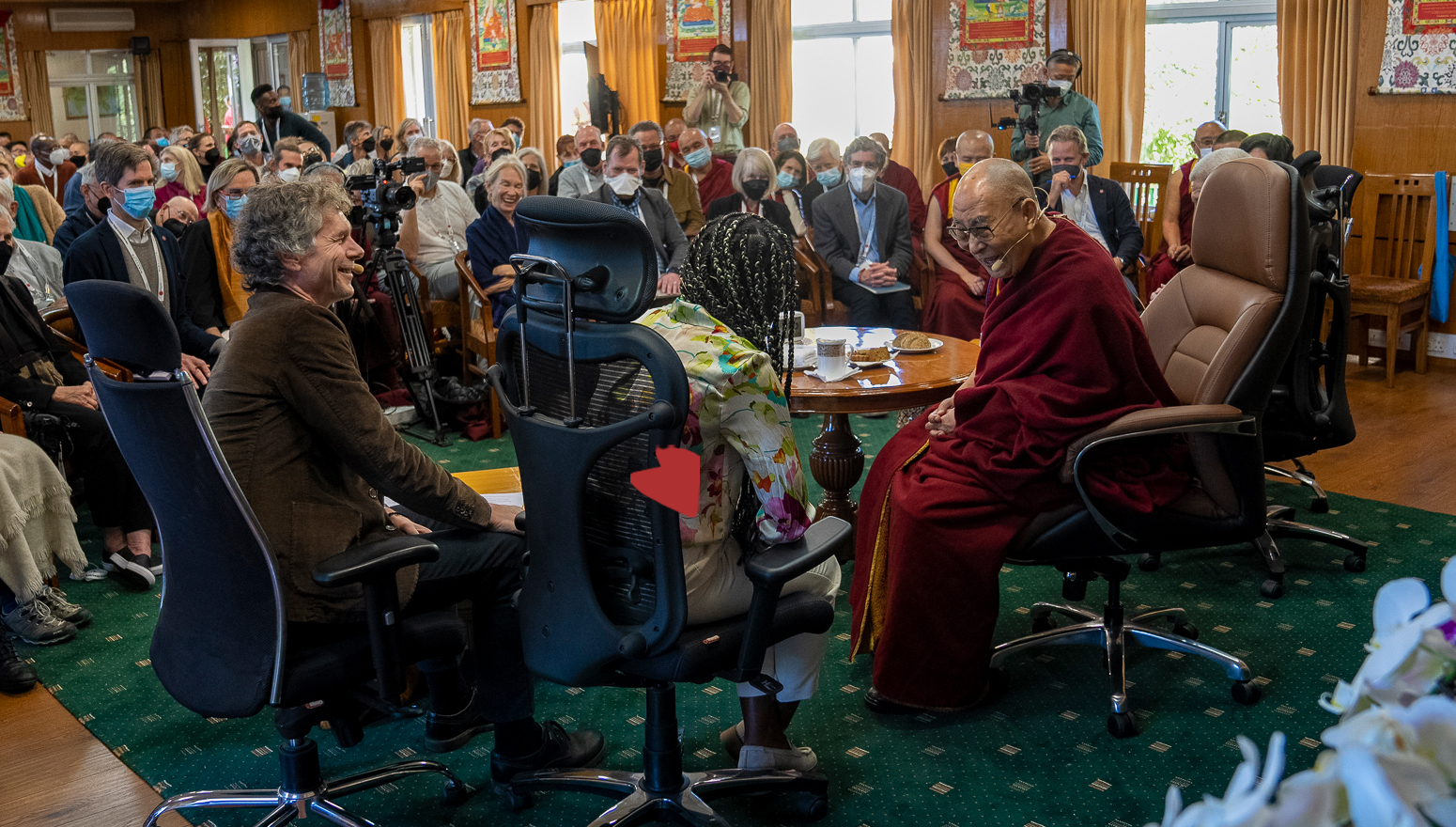
INTERDEPENDENCE, ETHICS, AND SOCIAL NETWORKS
Photos by Tenzin Choejor/OHHDL
A two-day conversation exploring the intersections between Buddhism and science was held on the 12th and 13th of October in the audience hall of His Holiness’ Residence in Dharamshala. The Dalai Lama Trust is delighted to have co-hosted this conversation between His Holiness and the Mind & Life Institute. This year’s theme was Interdependence, Ethics, and Social Networks. The event was attended by around 180 people, of which approximately 100 were staff, speakers and guests of the Mind & Life Institute, the remaining 80 consisting of monks and nuns connected to various science programs and abbots and scholars from South Indian monastic institutions.
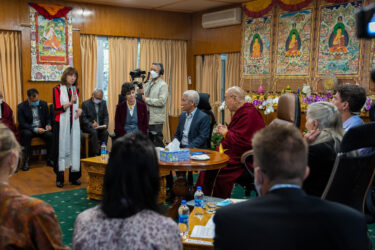
As His Holiness entered the hall, he reassured us that he recently had a check-up in Delhi and was given a clean bill of health, to which the audience rejoiced. Susan Bauer-Wu, president of the Mind & Life Institute, welcomed His Holiness, noting that it had been three years since seeing him in person due to the pandemic, making this event particularly special. She explained that this event was a collaboration between the Mind & Life Institute and Mind & Life Europe and also marked 35 years since the first Mind & Life Dialogue in October 1987.
His Holiness began by commenting that several Mind & Life events have now been held, which he considers very important. Introducing the purpose of these conversations, he pointed out that tremendous attention is paid to understanding the physical and material world at the moment while it seems that much less attention is given to exploring and understanding the mind. “When we talk about the human experience of happiness and suffering, we are talking about experience, which is a mental or inner phenomenon,” he said. His Holiness explained that no matter the amount of physical or material comfort one may accumulate, we would not be able to find happiness in it if we have not cultivated peace of mind.
His Holiness also noted that many of the conflicts, including war, that we see today are conflicts centred around material resources or the acquisition of power, which remain in the realm of matter. He cautioned us that due to climate change, we may be working with limited time and encouraged us to reflect on the past so that we can extrapolate the key insights which will give us the ability to build a future based on happiness, togetherness and peace. His Holiness pointed out that the critical point in all this is to cultivate peace of mind or inner peace, at the root of which lies a compassionate attitude.
His Holiness explained that at the time of our birth, our first experience is usually one of compassion, owing to the love and care we receive from our mothers. Subsequently, as children we find ourselves in an atmosphere of compassion, playing freely with other children. As children, we are happy to play with other children without making distinctions based on race, religion or family background. His Holiness shared his memories of playing with Muslim and Chinese children as a child. He pointed out that with the introduction of education, we begin to learn about divisions and that formal education generally tends to neglect any instructions cultivating inner peace. Expounding on the benefits of peace of mind, he mentioned that inner peace helps us maintain a healthy body and restful sleep, while conversely frustration, anxiety and anger are harmful to our bodies and sleep.
To this end, His Holiness expressed his wish to meet with professors from Delhi University to discuss how to incorporate the themes of basic human values like warm-heartedness and compassion into the educational field without mention of religion and with the sole purpose of maintaining good health and cultivating inner strength. “As social animals, our lives depend on others and therefore cultivating warm-heartedness is of great importance” he emphasized.
Dr. Richard Davidson then presented an overview of the program which featured four scholars- an anthropologist, a psychologist, a philosopher and a cognitive scientist. He explained that today we face several challenges, ranging from climate change to loneliness and depression. He said, “Depression is now the leading cause of disability and ill-health according to the WHO and these trends have increased during the pandemic. Loneliness is two-fold a risk factor for mortality than obesity.” He continued that during this conversation, the themes explored will be the importance of culture, our interconnectedness and cultivating a global identity as citizens of the world. He concluded by acknowledging the importance of the vision shared by His Holiness and Francisco Varela, the founder of the Mind & Life Institute and wished His Holiness a long and healthy life so that these conversations may continue for a long time to come.
His Holiness replied that peace of mind is extremely important for health reasons as it brings self-confidence and reduces fear. “The compassion which we received from our parents, particularly our mothers is a very precious thing that we should carry throughout our lives,” he said. His Holiness commented that he suspects that peace of mind, good sleep and pleasant dreams may affect the brain positively, while anxiety and anger may have negative effects on the brain. He mentioned that he believes brain specialists who have more experience may have similar findings.
Roshi Joan Halifax, the moderator for the session, began by noting how inspiring it is to see His Holiness well and healthy. She introduced the first speaker, Dr. Joseph Henrich, Professor of Biological Anthropology at Harvard University, who studies multiple disciplines and will be talking about the relationship between biology and culture.
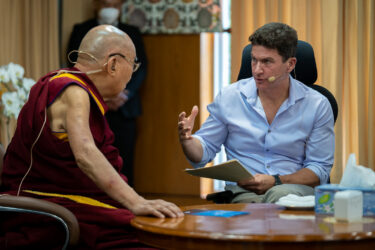
Dr. Henrich opened his presentation by explaining that his lab is focussed on the question of what makes us human and how it is that we humans, among all other animals, have expanded into the earth’s many diverse environments and how we have survived and thrived. He expounded, “This is not a recent problem, humans expanded across the earth over 100,000 years ago, from the malarial swamps of New Guinea to the Arctic tundra, Siberia and eventually Canada.”
He pointed out that when studying how we have been able to dominate in these environments, scientists typically point to our use of language, tool-making and co-operation. He explained that his research is focused on the patterns beneath these abilities we have developed. The key insight gleaned from these studies suggests that we are a cultural species and that our culture is cumulative. He continued, “Each generation gets a cultural inheritance from the prior generation and we modify, hone, refine and pass that down to the next generation. This allows us to generate a cumulative and vast body of knowledge that allows us to survive and thrive.”
He explained that one of the problems when addressing the issue of human nature may be that we have glossed over the part that culture or cultural products have played in changing our genetics and nature in unexpected ways. He noted that our culture has affected our physiology, our anatomy and our minds. He illuminated this by giving the example of how dramatically the advent of fire and cooking changed our biology by shortening our colon, making our stomach smaller, shrinking our teeth and weakening our jaw. He explained that culture was also probably responsible for the expansion of our brains which acquire, store and process the information that we learn, the extension of our childhood so we can better absorb and process the information and skills we are exposed to like language, thinking, etc.
His Holiness replied that global warming will not hurt or spare anybody on the basis of nationality, making it absolutely critical that we begin to recognize the oneness of humanity. He went on to say that violence and war on the basis of things like nationality are outdated ways of thinking and that a broader approach is necessary.
Dr. Henrich replied that his research endeavours to study a more nuanced and detailed understanding of human nature so that we can build the sense of oneness His Holiness has suggested. He explained that the process of culture-gene co-evolution has shaped our psychology in ways that could be useful in building this oneness. Dr. Henrich expounded that there is a domain of psychology that he calls ‘norm psychology,’ where cultural evolution appeared first and built social norms and rules, followed by genetic evolution which allowed us to expect and internalize these established social norms. He explained that this can be harnessed to cultivate altruism. This, he commented, is the first aspect of human nature in his research.
The second aspect of human nature, he explained, is called ‘inter-dependent psychology,’ where cultural evolution appeared first and spread co-operative norms like food sharing. Anthropologists who have studied diverse cultures observe that where food sharing exists, a network is built, within which food is shared widely. Our psychology then shifts to assess who is in this network, because their health and survival directly affect our own survival, creating natural altruism towards those in your network. This trait could be harnessed towards creating a larger global network of concern.
Dr. Henrich then explained the third aspect of human nature known as ‘ethnic psychology,’ where once again cultural evolution first appeared to create groups with certain norms. These groups were marked with particular languages, dress, etc. To navigate a certain group, genetic evolution inclines us towards this ethnic psychology, where we preferentially interact with people who share our ethnic markers and we learn from them. While this may lead to ethnic stereotyping, it can also potentially be harnessed if we were to create a global identity. In that case, using ethnic psychology to cultivate this feeling of closeness could be a powerful tool.
His Holiness then emphasized that as the world is rapidly changing, we must learn from our past in which differences like nationality and race played a big part. Encouraging us to leave behind this short-sighted way of thinking, His Holiness advises us to think more broadly and to recognize all human beings as our brothers and sisters, explaining that this approach can move us towards a happier world.
Roshi Joan Halifax, the moderator, then introduced the second presenter of the day, Dr. Molly Crockett, who is an associate professor of psychology at Princeton University and represents the younger generation of scientists who use many different disciplines in order to bring greater depth into understanding the human condition. Dr. Crockett’s research looks into how the stories that we tell each other about our human nature can either constrict our circle of compassion or expand it.
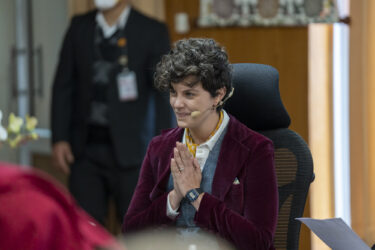
Dr. Crockett opened by noting that modern science is very consistent with His Holiness’ views on the oneness and interdependence of humanity. However, she pointed out, that not everybody believes this, believing instead that human beings are fundamentally selfish and cannot extend their compassion towards everyone. She explains, “My research looks into what happens when we tell stories about compassion and what happens when we tell stories about division.
“The idea that humans are fundamentally selfish is unfortunately still very popular. It has had a strong impact on policy-making as we’ve seen throughout the pandemic, where leaders have repeatedly set policies motivated by the worst assumptions about human nature. But the science tells us that these assumptions are not complete or correct. We know from research that helping others makes us happier.” Dr. Crocket explained that generosity activates the same pleasure centres of the brain that light up when we eat a delicious meal or watch a beautiful sunset.
His Holiness commented that we have this wonderful intelligence and therefore using the five senses is not enough, we must use the sixth, the mind- which has the ability to analyze phenomena. We must therefore analyze the past mistakes in our short-sighted thinking and develop a broader view which encompasses all seven billion billion human beings.
Dr. Crockett replied that she agrees with His Holiness’ view that we are all one, but pointed out that not everyone agrees with it. She explained that the view that human beings are fundamentally self-interested motivates the powerful to exploit working people and the earth because they can tell themselves everyone is selfish and that this is the natural order of things. This can make it harder for the rest of us to co-operate and work together collectively.
His Holiness commented that everybody wants happiness, however, we cannot buy happiness from a shop or produce it with a machine. He explained that happiness depends entirely on our way of thinking and given the several conflicts in the world right now, we must recognize that this way of thinking is flawed. His Holiness advises that we leave this old way of thinking in the past and use our intelligence to create a better future.
Dr. Crockett explained that her research explored how we can tell each other a more positive story about human nature and how interconnected and compassionate we can be. His Holiness agreed, saying “Yes, that is true. Our lives depend on other people and that is why it is very important to build a happy human community. We all want a happy life and have the same right to achieve a happy life.” His Holiness expressed that the conflicts between Russia and Ukraine, between North Korea and South Korea and between China and Taiwan are extremely saddening and pointed out that the people of these regions are very similar, some sharing the same languages, religions and backgrounds. In His Holiness’ view, the reasons for these conflicts are not in line with the premise that we are fundamentally one and instead focus on secondary smaller differences which are very short-sighted.
Dr. Crockett replied that these conflicts that His Holiness noted are just one example of the violence that we see through history when we tell hateful stories about one another. She continued, “But it doesn’t have to be this way. My research has studied what happens when people come together and tell a more positive story about human nature. When we study people coming together in mass gatherings like the Kalachakra ceremonies or festivals that celebrate love and creativity, people can be transformed. They can change the way they see themselves and what they care about. My lab has studied an event called Burning Man. This is a mass gathering of 80,000 people.
“Our research shows that even in a non-religious setting when people come together and spend several days in a culture of generosity, it is very psychologically powerful. At these events like Burning Man, we see that people are twice as generous as we would typically see in lab studies of generosity. We see that people feel more connected with all of humanity and we see that increase with every day they spend there.”
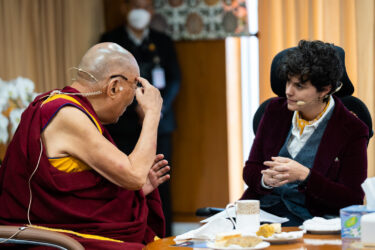
Dr. Crockett then posed a question to His Holiness about the role of leaders and how they can help us. His Holiness replied that in democratic systems, leaders are chosen by the public, therefore if we the public were to think in wiser and more realistic ways, the leaders coming from such societies would be different as well. However, so far most leaders seem to follow in the footsteps of past leaders, emphasising power and military strength. His Holiness expressed that according to him, it is time to promote genuine warm-heartedness through education so that the kind of leaders produced would also carry the qualities of warm-heartedness and compassion. His Holiness joked that he wants to tell those leaders who are interested in power that in some decade’s time when global warming will reach a critical stage, their power will be of no use, in fact even nuclear weapons will be of no use. His Holiness, therefore, advises us that a better use of our time would be to develop a spirit of oneness.
Dr. Crockett suggested that leaders can play a very important role in all of us getting along together. She explained that her lab studied this during the pandemic and found that trust increased in leaders who shared medicines and supplies around the world where they were needed the most, while it decreased in leaders who set policies that kept these supplies in their home countries. She then posed a question to His Holiness, asking “Your Holiness, why do you think it is that many people still believe in selfishness even though contemplative wisdom and modern cognitive science tell us that we are all connected?”
His Holiness replied, “I feel our education system and materialist thinking are the cause. I really feel that we should educate students on warm-heartedness as the key factor for peace of mind. Peace of mind is also very helpful when studying. Too much fear and frustration are very harmful when studying. Peace of mind does not have to be seen in terms of our next lives or heaven, but simply for the purposes of studying well. Peace of mind is very much based on warm-heartedness. Inner peace brings self-confidence and inner strength.”
Dr. Henrich then asked His Holiness about his thoughts on how to reconcile the need for global oneness with the need for social co-operation in smaller local communities. His Holiness responded that while is it true that different languages and cultures within communities may affect their ways of thinking, we must think more broadly in terms of humanity. He expressed that the topic is a difficult one, however despite different languages and the words they use, all communities should carry the same message of warm-heartedness. He gave the example of Tibetan Buddhist texts which were translated from other languages like Sanskrit and Pali. Despite this, he explained, we are able to practice and carry the underlying values. Therefore, His Holiness pointed out, that even though we may have different languages, the content remains the same- that of the oneness of humanity.
Dr. Crockett then asked His Holiness a question about the role of anger in social progress and in bringing us all together. While acknowledging that anger can be divisive and create conflict, Dr. Crockett noted that anger can also help motivate us to seek social justice and positive change. His Holiness replied that when trying to correct something, we should employ a gentler approach rather than becoming angry or using harsh words. If a teacher were to talk to a trouble-making student, it would be enough to show the student that disruption is not aligned with their basic human nature. His Holiness cited an example of his own education, noting that his teachers were always kind to him, which is why he was motivated to study well. He also mentioned that based on experience, when he gives teachings, he makes it a point to smile. He explained that being angry and harsh is unnecessary when interacting with people, even if only for the selfish purpose of making our point known. His Holiness seemed to be making the point that people are more receptive to a positive disposition rather than to an angry one.
Dr. Henrich then posed a question to His Holiness. He noted that when we feel a sense of interdependence with others, it is easier to feel warmth and compassion towards those people and as the world becomes much more interdependent either in terms of finance or as we saw during the pandemic, he wondered if there might be a way to convey this interdependence and therefore make it easier for people to feel more compassionate globally. His Holiness responded that now totalitarianism is outdated and people accept democracy, which is very good as it requires the public to be respected and heard. He explained that the public must also develop concern at a larger scale instead of limiting their concern to smaller circles. We must realize that as we all have to live together, world peace depends on each individual that ultimately makes up the entire global population. Conflicts should be resolved through peaceful and patient talks rather than military force. He noted that people are now more educated and aware, with greater access to media and information, and so we must think about our current situation through this new lens of oneness.
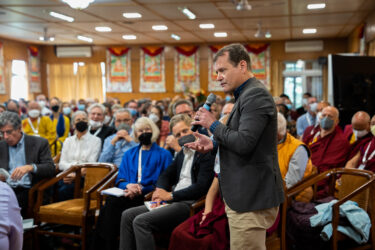
Dr. John Dunne of the University of Wisconsin-Madison then briefly summarised the session by expressing that this conversation had been important in discussing how the Buddhist sciences can contribute to what we could teach in order to cultivate a global identity and sense of oneness. He quoted the scholar Shantideva saying “All those in the world who are unhappy are unhappy because they are seeking their own happiness and all those in the world who are happy, are happy because they seek the happiness of others.” He noted that this sentiment could perhaps be the basis to bring us all together.
His Holiness responded that he agreed with this and although it comes from a Buddhist text, the message itself is universal. His Holiness then quoted the following verses which say “What need is there to say more; Just compare where we are and where the Buddha is. The Buddha who has devoted his life to altruism is fully enlightened; We who are stuck in self-centredness are where we are now. Therefore, those who aspire to an enlightened state should ride the horse of an altruistic heart and travel from place to place of joy. What intelligent, discerning mind wouldn’t want to do that?” His Holiness explained that these beautiful verses really capture the imagery of someone who is enthusiastically riding a horse to a place of joy. His Holiness also mentioned some verses from Chandrakirti’s Entering the Middle Way which state that through the insight gained from applying our wisdom, particularly exploring the nature of our reality, which points to the fact that what we assume naturally as having some kind of intrinsic existence is actually just an assumption we grasp to and need to let go of. As we come to recognize the true nature, which is empty, it will open a path for us. This wisdom also needs to be combined with compassion for all sentient beings as a natural expression of that state. Wisdom and compassion together can be seen as the two wings of a powerful bird that combined can truly travel to an enlightened state. His Holiness explained that he recites these verses daily and feels he can taste something pointing to this direction of progression in this very lifetime. He expressed that he thinks of the little child he was in the Amdo region of Tibet growing up and is now trying to get at least to the path of preparation. He added that he also hopes to drag others along with him to the state of Buddhahood.
Dr. Davidson offered the final words, thanking His Holiness and pointing out that ritual and prayer are not enough and that we need to train our minds. He noted that His Holiness has mentioned that every human being has the capacity or even the right to happiness and asked His Holiness to speak on what every single person could do to train their minds. Dr. Davidson mentioned that when humans evolved, they did not brush their teeth, whereas today almost everyone brushes their teeth. Dr. Davidson asked “If we spent a few minutes a day training our minds, what is it that we should do? His Holiness responded that we should reflect on how our lives depend on others from the time of our births and throughout our lives. This helps build a sense of inner peace and compassion which is good for our health and sleep as well. He reiterated that it would be helpful to introduce this topic into mainstream education to remove any religious connotations associated with the concept of compassion, which is a key factor for inner strength and intelligence. His Holiness concluded by saying that he is relying on the scientists to help materialize his vision and requested the group to make an effort in their own communities which gradually will expand to all of humanity. His Holiness expressed his hopes that the group would learn from his experiences and vision and take it with them wherever they go, sharing it at the appropriate time. With this, His Holiness left the audience.
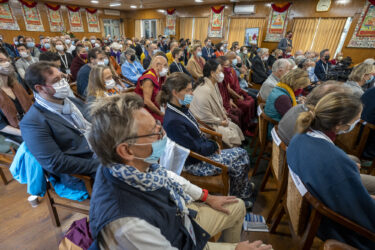
Following a short break, a panel discussion was underway. Dr. Crockett explained that the stories we tell each other and ourselves create our reality. She explained that reframing destructive and divisive stories into co-operative and loving stories could have tremendous positive implications. She also discussed the positive and negative implications of moral outrage, especially as observed online. The positive implications are that online moral outrage can open discussions and create communities working for positive change while conversely, it can also create more divisiveness and conflict between people. She went into more detail about the Burning Man festival, noting that while many may think the positive outcomes of the research may be due to the substances taken at festivals, the results observed went far beyond any observed influence they might have held. Dr. Crockett observed that generosity was doubled in this atmosphere of inclusivity and that the positive transformations remained for six months after the festival ended. This shows us that such an accepting environment can have long-lasting effects that reach far beyond the few days spent attending the festival.
Dr. Richardson noted that we should not underestimate the potential of elasticity and cited medical examples of people who recovered from serious conditions that were not thought to be reversible. He also added that when it came to the stories we tell, it appeared to him that more important than changing the story, was the relationship itself with the story. He explained that becoming aware that you have a story in the first place is a good first step. Dr. Dunne then noted that taking this approach and scaling it up in terms of the number of people could lead to stronger local and global communities.
A brief question and answer session followed. One participant asked the panel what could be done to instil a sense of community. Dr. Henrich answered that according to him, setting up voluntary organisations would be a good first step. He also noted that working from home could make things worse in the long run as it may cause a sense of isolation, whereas meeting and engaging with people is more conducive to creating a sense of community.
Another participant asked about the utility and the stories around anger and how to harness it. Dr. Dunne replied that anger usually obscured good qualities and exaggerates bad qualities. He also suggested that perhaps we confuse anger as the only appropriate response to certain situations when there may be several other ways in which we could respond. He also pointed out that disgust is culturally variable, giving the example that once while in India meeting a respected teacher, he wiped his nose with a handkerchief, which the teacher found to be disgusting. The culturally appropriate action would have been to go to the side of the road and blow one’s nose into the canal, which would be seen as disgusting in the west. He concluded that these variations show us that there are more ways to react to something than we may think and that remaining open to other possibilities could be beneficial. Dr. Geshe Jinpa la added that the utility of anger is the energy it creates or brings out of us. This implied that perhaps we could utilize the useful parts of anger while rejecting its harmful aspects. This Dalai Lama Trust offered lunch to all the participants of the conference which concluded the first day of the conference.
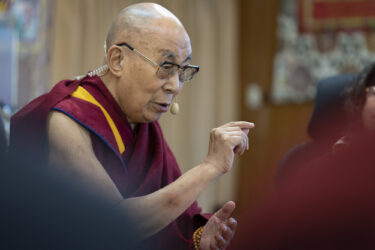
His Holiness started the second day of the event by giving insight into the Buddhist understanding of the mind. He noted that scientists, in particular, are not investigating the consciousness enough. He pointed out that when they say ‘consciousness,’ they are mainly referring to the brain. He gave his own example, saying “My body is getting older and older but my mind is getting younger and younger.” He noted that this would suggest that the mind is independent of the body. He advised that investigating the mind is a worthwhile and important endeavour. His Holiness repeated that while his knees were more wobbly, his mind was sharper and contained a greater depth of experience. He explained that therefore, the body and mind are separate. He continued, “When we think about the mind, it can get complicated. The mind is not produced by the brain, it is its own entity. This brings up the subject of a continuum of mind. My mind today is the continuation of yesterday’s mind.
The Buddhist term for ‘conception’ translates to ‘beyond the simple meeting of physiological factors coming together.’ Buddhist texts even describe the environment present at the moment of the consciousness entering the composite. The continuity of the first moment of consciousness of the child has to be traced to its prior moment. This reasoning is like a process of elimination, so if conception were simply a physical process, then the coming together of the two factors to create a composite should always give rise to conception, which is not the case. Therefore conception requires more than the coming together of physical factors, the third factor being the presence of the continuity of consciousness. Therefore it is very worthwhile to investigate what consciousness is.” His Holiness explained that while this understanding comes from various Indian traditions, the Nalanda tradition contains answers to several questions like the origin of the mind.
His Holiness explained that even twins who share 100% genetic material have differences in their personalities and characters, suggesting that the mind cannot be only a physical entity. Therefore when investigating the mind, it is quite clear that we need to look beyond the physical. His Holiness pointed out that at the heart of consciousness is a luminosity or clarity which would be hard to explain as a product or function of the brain. He then asked Dr. Davidson what his thoughts were on the distinction between the consciousness and brain.
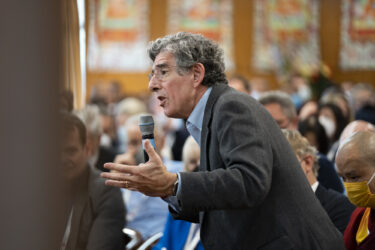
Dr. Davidson replied that this is an important topic that has been discussed for years. He noted that His Holiness has mentioned in the book The Universe in a Single Atom, that the scientific belief that the mind is the brain is just that, a belief and not a fact. Dr. Davidson explained that this is known as a ‘hard problem’ in neuroscience, showing how experience arises in the brain. He pointed out that in his view, no progress has been made in really understanding this over the last century.
His Holiness reiterated that the brain is a physical organ that, over time, should decline, which is not the case. This signals that the mind is separate from the brain. He explained that peace is something that is found in the mind and that while we may enjoy physical comfort, it should not be confused with inner peace. The five senses experience physical phenomena, however the sixth is the mind, which has the ability to think and analyze, an ability which is not dependent on physical matter. Therefore it is worthwhile to investigate the mind. His Holiness suggested that once we accept that a separate consciousness exists, the next question would be what its causes are, which would bring up the concept of the continuation of consciousness. “This would mean that the first moment of my consciousness in this body must be the continuation of a previous consciousness, posing the question of a previous life,” he said. His Holiness recounted that as a young child, he had memories of his previous life, which shows the continuation of consciousness. In the Indian and Tibetan traditions, the mind is therefore seen as a continuum, which also gives us the courage to improve our minds and cultivate certain good qualities of the mind. This approach gives us the confidence that we can transform our minds over time to reach the level of the Buddha’s mind. He explained that many qualities of the mind can be cultivated and perfected through its continuum.

His Holiness cautioned us not to look at the consciousness as a monolithic thing as there are many levels of mind ranging from the coarse to the subtle and even the very subtle levels. He explained that in Vajrayana literature, there are extensive explanations of these levels of consciousness, describing how from the coarser levels of consciousness we can arrive at subtler levels until finally, a purely luminous state of consciousness manifests. One of the indications of this process can be seen in a particular phenomenon that occurs when some people are considered clinically dead but their body does not decompose for prolonged periods. They are said to be going through a progressive process of the subtlety of consciousness. This process can be seen as independent of the body as the person is considered to be clinically dead as this process unfolds. This involves a daily practice where the meditator goes through a simulation of various processes of dissolution of the body from various elements and the dissolution of the consciousness itself which is divided into four stages called- appearance, increase, attainment and finally the experience of clear light or pure luminosity. When someone who is familiar with this process of dissolution from their daily practice is faced with the actual process at the time of death, they are effortlessly able to recognize the process they are going through and maintain awareness through the process. The process involves an increasing level of moving beyond the everyday experience of duality- subject and object, external objects, habitual thinking patterns, culminating at the point of clear light where the primordial consciousness comes to manifest and all the perceptions of our ordinary mind disappear. Thuktham is the state where the individual is maintaining a state of clear light for an extended period of time.
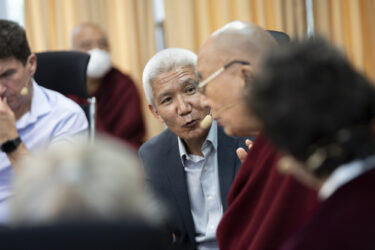
His Holiness explains that the yogi here is actually utilising naturally occurring processes, like the dissolution process at the time of death. Through Sadhana or practice, the yogi familiarises himself or herself with the process and therefore death is an amazing moment to seize the opportunity provided by the natural dying process while maintaining awareness through the stages so that they are able to get to the final point which is also referred to as ‘all emptiness’ or ‘clear light.’ It is important for the yogi to utilize this moment to realize emptiness. This is an important practice which then can become what is known in many tantras as the ‘illusory body.’ The important point to note here is that the yogi is able to utilize the naturally occurring phenomena of the process of death to access subtler states and finally realize emptiness or the nature of reality. Yogis who are able to reach this stage may also have the ability, partly also due to their merits, to choose their next rebirth.
Amy Cohen Varela, Board Chair of the Mind and Life institute welcomed His Holiness and explained that this second day of the event featured scientists from Mind & Life Europe, coining it a ‘European Day.’ She read a letter penned by Gabor Karsai, the Managing Director of Mind & Life Europe who sadly could not attend the meeting due to a last-minute positive covid result. In his letter, he expressed his sadness at not being able to attend the conversation, reflecting on the fragility and uncertainty that the pandemic has brought into our lives. On the other hand, he expressed joy in celebrating the wealth of wisdom gleaned from His Holiness for the last 35 years of these dialogues and thanked His Holiness for this gift and wished the participants a wonderful session.
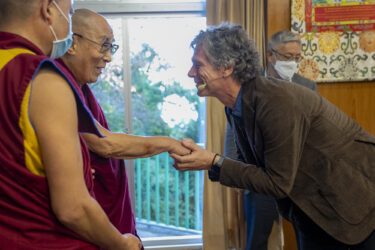
Martijn Van Beek, from Aarhus University, then introduced the two presenters of the day from Europe and Africa, Abeba Birhane and Hanne De Jaegher. He welcomed Hanne De Jaegher, a professor at the University of the Basque Country in Spain, who is a philosopher and cognitive scientist and works in the tradition of Francisco Varela and whose research focuses on understanding who we are as individuals and in relation to others.
Prof. Hanne De Jaegher began her presentation by saying “Good morning your Holiness, I study how people interact with each other as we are doing now. One of my motivations for my work is how we can interact better with big differences between us. You emphasized that we are all the same, that there is a oneness to humanity, but we are also quite different.” She pointed out that while he is the Dalai Lama, a person of enormous importance for many people, a man and Asian, she, on the other hand, is a lay person, a woman and European. She noted that while they are the same in many ways, they also interact while being different. She explained that her work includes learning how to make these interactions better and helping people have trust in their own capacities while interacting, even with these many difficulties in the world.
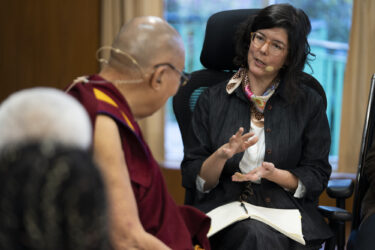
Prof. De Jaegher mentioned that she had seen videos of His Holiness interacting with his friend Archbishop Desmond Tutu and noticed that they have a shared humour, which she believes comes from a tension between the commonalities they share, the differences between them and the love and closeness between them while acknowledging that there is also a distance between them. She pointed out that these factors create a kind of tension between people. She continued, “You are you, I am me and we interact and something emerges and this can create a kind of tension. Those are grounds for skill and capacity and things like playfulness in social interactions. I have a question for you your Holiness, do you think these differences between people matter when we are trying to interact with each other?”
His Holiness responded with a resounding “No!” He explained that he has mentioned how important the oneness of humanity is. Different countries and systems are our own creations. Fundamentally all human beings are the same. These distinctions we make are an old way of thinking which causes conflicts. His Holiness advised that we should believe in the oneness of humanity. Prof. De Jaegher replied saying, “ I agree with you, your message is important and I hope that people really listen when you say that. At the same time, some of the differences between us are very enriching. I’ve learned about Tibetan culture while I’ve been here and I wouldn’t want to take that difference away because the world would become poorer if we did that. The concern for oneness is something we all share but we also have a concern for our own cultures. These are things that are different about us and I think it’s better this way.”
His Holiness responded that while it is true that cultures and languages differ, we all have to live together on this planet. Judging by the past, this emphasis on our differences has caused too many problems, which is why it is now time to recognise the oneness of all human beings. When it comes to different cultures, His Holiness said, “If I may say so, we must investigate the value of a particular culture. If we find something good, it is worthwhile to preserve it. However, frankly speaking, certain cultures can be very narrow-minded and there may be no use in preserving them. For example, we Tibetans learned from a variety of Indian schools of thought. Looking at one subject from different angles gives variety to the object of study. Therefore, being exposed to different topics and concepts from different places is very useful for human intelligence. Then we each have a right to judge what views are founded in reason and what views are based on blind faith. We have to investigate these things. For that reason, in our tradition, we learn all the existing Indian traditions and then we debate them. However, we learn them, which is very useful. So you can learn everything and then investigate it. We even have the right to investigate the Buddha’s own words and cannot accept any words that are against reason.”
Prof. Jaegher agreed with His Holiness’ point on the importance of learning from different schools of thought and the importance of debate. She explained that when we meet other people, something happens between us that can change us and that brings us the possibility to learn from each other. She pointed out that often in society and the ways of thinking within it, we tend to feel like we do this thinking as individuals, however, when we are together, something happens between us which can change things for us. She illustrated this phenomenon that occurs between two people by recounting an instance that most people have experienced – you are walking on a narrow path in one direction as another person is walking from the opposite direction and as you are in each other’s paths, you stop at some point in front of the each other, then you step to one side and so does the other person, so you step to the other side and the other person moves to that side too. Somehow both parties are co-ordinating even though they don’t intend to, but as they are together, something emerges and determines how you and the other person act.
She continued, “This is the strength of the autonomy of interactive forces which take over and change us. We don’t just change each other, what happens between us also changes us. Consciousness also comes from another third factor which is the ‘between us.’ So our mind, our thinking, and what we understand also comes from this process between us that changes us. It is not just that we are each individually doing our best and can share common concerns, but also how we interact that changes us. This is the third factor in what we know and how we can know. This shows something about the importance of the oneness of humanity and the concern for making the world better, but also our own individual concerns as well. Between these two levels, there is a lot of complexity. We can understand and learn about this complexity and the unpredictability of it by understanding this other third factor which is what happens between us.”
His Holiness responded that in the past we have built individual identities that are based on differentiations or distinctions like race, religion and nationality and this identity has really caused a lot of problems. It is not that there are no differences between us, there are indeed differences. The problem occurs when we over-emphasize these differences. Therefore, His Holiness explains that we should put the emphasis on our commonalities and shared concerns rather than our differences. Certain things like the outcomes of global warming are now out of our control, so we should focus on what is within our control to change and improve the world. His Holiness joked that if we recognize all human beings as one, we can marry people of other cultures and produce good children, however, if we make too many distinctions, it may be hard to find a partner.
Martijn Van Beek then introduced the second speaker of the day, Dr. Abeba Birhane, who is a researcher studying artificial intelligence. He explained that artificial intelligence is a method of using computer programs to take the human being out of the equation. Dr. Birhane is a senior fellow in Trustworthy AI at the Mozilla Foundation and an Associate Professor at the University College Dublin in Ireland. Her interdisciplinary research addresses the problems and challenges of artificial intelligence, models and data sets.
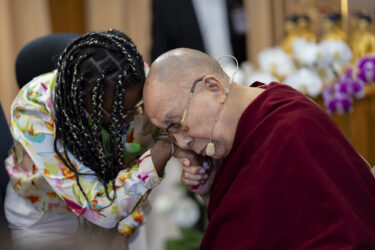
Dr. Birhane opened her presentation by explaining that she would be talking about technology today and asking His Holiness if he uses a laptop. His Holiness replied that no, he does not use a computer or laptop. Dr. Birhane explained that technology is very important as it influences many things – democracy, wars, and elections. She said, “Almost everyone in this room has a smartphone and therefore interacts with technology. This is why it is important to understand technology and that is what I study.” She then explained that in this presentation she would be focusing on one type of technology called face recognition system which is a kind of technology that learns what a face looks like by looking at thousands and sometimes millions of faces. By training the artificial intelligence system through data, it will eventually be able to tell the difference between a face and something that is not a face. She explained that this technology can be found everywhere like when people apply for visas, this technology can determine whether they get the visa or not. It is also used when distributing aid to refugees, especially in Easter Africa, their images have to be processed by this facial recognition system.
Dr. Birhane noted that technology has made things easier now and has certain positive uses, however, it can also cause problems for people. She pointed to one example of this, explaining that in a study that was done 3-4 years ago, her colleagues studied facial recognition systems from three companies – IBM, Microsoft and Face++ to measure how accurate these systems were. They found that the facial recognition systems of all three companies are not very accurate when it comes to recognizing people of colour. There was a 35% error rate when given images of black women, while there was less than a 1% error rate when given images of white men. Dr. Birhane explained that this is a problem because these systems are not trained properly as they are not given good data that represents everybody.
Another important issue Dr. Birhane raised was that until about 30 years ago, the most powerful companies in the world were automotive companies, food chains and supermarket chains. According to a recent survey, she said, “The most powerful companies are all technology companies for example Apple, Alphabet (which is part of Google), Microsoft, Amazon and Facebook. These companies that are making artificial intelligence and selling it to governments, institutions, businesses and individuals the world over, are becoming richer and richer while the people who are judged or measured by these systems are becoming even more disenfranchised and displaced, like immigrants and people seeking visas. There is an imbalance here.” Dr. Birhane then posed a question to His Holiness. She pointed out that this is the current reality of technology which is only going to become bigger with time and affect more people. She asked His Holiness his thoughts on technology and its tendency to benefit some while harming others.
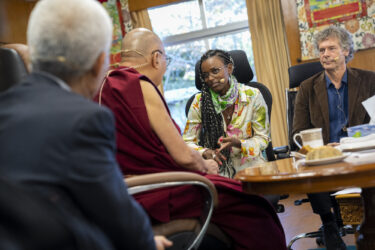
His Holiness replied that generally speaking, regardless of the technology, the important factor is how it is used and who the user is. He explained, “We human beings are not slaves to machines, we are the masters of machines and can use and control them.” Dr. Birhane readily agreed with His Holiness, noting how glad she was with His Holiness’ answer as this led to another topic she has researched recently. Her lab studied the priorities or values of people creating these technologies. The research found that many of the big companies developing this technology valued performance, efficiency, and novelty and are mainly interested in making things faster and removing people from processes. Values such as fairness and justice were not priorities for most of these companies. In a study looking into the 100 most influential artificial intelligence papers, 98 of these were found to prioritize efficiency and performance while only 2 papers mentioned societal implications. Therefore it is true that how we use technology is what makes all the difference. She said, “The data shows that the people making the technology don’t really want to use it to help people who need it but want to use it to make more money.”
His Holiness replied “I agree. Basic human values are now secondary and money is the first priority. This signals that something is wrong. Our lives and thinking have become too materialistic. However, we are still human beings and there is no reason to neglect our shared basic human values. There is too much emphasis on superficial differences.” His Holiness pointed out that their differences in colour are purely superficial, playfully placing Dr. Birhane’s braids on this head while explaining that on the basic level, we are all the same. Dr. Birhane asked His Holiness what kind of ethical principles we can learn from his teachings when developing technology in an industry which is primarily motivated by material wealth. His Holiness replied that warm-heartedness is the most important factor. All religious traditions have warm-heartedness at their core, however, warm-heartedness can be cultivated in a purely secular context as well. His Holiness said, “Technology is supposed to serve human needs and values. In the past few decades, the countries with the greatest increase in material development and technology were considered superior, which is an incorrect view. Societies with better technology have some differences on superficial levels, however, at a deeper level, they are exactly the same. The way we are born and the way we die is the same for everyone.”
Dr. Birhane posed a question to His Holiness by saying, “Computers work by finding the superficial differences between people, what is your message for people who develop technology?” His Holiness replied that while he loves and uses technology to some extent, people involved in technology are more knowledgeable about it than him. He said, “Technology should be used for the benefit of humanity, including ecology. Focusing on only technology without taking into account human values and ecological concerns is extreme. The advancement in technology should always go along with our needs and for our benefit.”
Amy Cohen Varela gave the closing remarks on behalf of Mind & Life Institute and Mind & Life Europe and thanked the personnel of His Holiness’ Private Office and Residence and all the participants present. His Holiness noted that he considers the people involved with Mind & Life real friends and not superficial acquaintances. He commented that they have remained genuine and trusted friends over several years and expressed his gratitude for their genuine friendship and mutual respect. He pointed out that as he became popular and Tibetans inside Tibet saw him interacting easily with different people and making friends, they began to consider his friends to be friends of Tibet, appreciating this warm relationship. He said, “Although we Tibetans are passing through some difficulties, we have truth and inner strength on our side. Some people say that China controls Tibet politically, however eventually we Tibetans are controlling millions of Chinese people who follow my Buddhist teachings. This has brought tremendous strength to Tibetans inside Tibet. As time passes, the truth becomes clearer. Although I faced some hardships for a few decades, eventually the truth will show its power.” His Holiness then shared that based on his last medical check-up, he believes that he may live up to the age of 100 or 110. The audience rejoiced and clapped at this comment. His Holiness concluded by saying that he is truly hopeful for the future as the world becomes better.
Following this session, His Holiness graciously accepted taking photographs with the participants and then left the audience. After a brief tea break, the last session commenced. Prof. De Jaegher gave a more detailed presentation of her research. She opened by explaining that ‘knowing’ contains a whole spectrum of smelling, tasting, seeing, hearing and touching. On the topic of social cognition, she stated that all our cognition is social. She gave the example of siblings who promise not to fight when they reach mum’s house but inevitably end up fighting anyways. This suggests that while we can decide certain things, entering into an interaction with someone can change our course, once again affirming that a third factor arises in the interactions between two people. She then spoke about participatory cognition, noting that language is a phenomenon that we participate in, making it more fluid and malleable than a strict set of grammatical rules. She concluded by explaining that the depth of the human capacity and skill of relating to each other is worth learning about in the cognitive sciences.
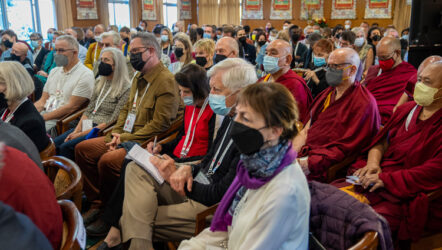
Dr. Birhane then began her presentation by explaining that she studies the societal implications of artificial intelligence. She explained that artificial intelligence is a model of the Deep Learning Revolution that came to life because of the ability to control large amounts of data. This became possible with the advent of the internet although the techniques themselves were developed in the ’50s and’60s. She pointed out some examples of the shortfalls of AI, indicating one case in which Amazon used AI to sort through their hiring process. Whistleblowers found that the program was removing women from the system because historically the company was comprised of more than 80% males. AI can be found in our phones, computers, on social media, at airports and in several other places. Dr. Birhane pointed out that there are two important points we must keep in mind when it comes to AI. The first is that while it may be known as ‘artificial,’ this technology creates a real impact on the lives of real people. The second point is that we normally think of AI as a godlike system or a fixed mechanism that cannot be wrong, make mistakes or break. This is absolutely incorrect as AI is actually quite brittle and experiments have demonstrated that by changing a single pixel on an image, the AI system can be fooled. This suggests the system is not as robust and devoid of errors as we may think.
To illustrate this, she repeated the statistics she mentioned in the first session, where a study found a more than 35% error rate when identifying people of colour. At present, she explained, we know of 3 black males who have been wrongly recognized by facial recognition systems which resulted in imprisonment. On the other hand, the study detected a less than 1% error rate in correctly recognizing white males. This suggests that it is of paramount importance to feed the systems with data which is representative of the whole population rather than select communities.
She then mentioned that there are positive implications of AI as well, citing Nowcasting as an example. Nowcasting is a weather prediction technology that focuses on very short periods of time and which are is very accurate. She then cautioned us that AI has the potential to record, predict and sort categories like social status, race, etc. which may not be totally scientific and can have serious ethical implications as it is guaranteed to encode stereotypes due to its tendency to use historical data which may be irrelevant today. She explained that this may be because most, if not all the data comes from the internet.
Dr. Birhane noted that His Holiness was right in believing that the objectives determine the outcomes of AI or of technology in general. To this point, she reiterated that a study of the top 100 most influential papers in AI was conducted and it was found that 98 of these mentioned only efficiency and performance as their priorities, 1 mentioned societal implications in passing and one mentioned societal implications as its priority. This is indicative that the objectives and priorities of the companies developing this technology are not aligned with the needs of the average person. Another example of the application of deep learning, which is a subset of machine learning and responsible for AI is that 96% of pornography worldwide is made using deep learning. Dr. Birhane ended her presentation by explaining that the outcomes of AI are imbalanced and that when AI starts working for the most disproportionately impacted, only then will it work for all.
The floor was then opened to the whole panel. Prof. Jaegher and Dr. Birhane discussed that while in Dr. Jaegher’s work, friction is an important element that arises from human interactions, Dr. Birhane’s experience points to creating frictionless AI in order to smoothen the various processes. This discussion centred around the value that can be gleaned from friction and how it is important to the human experience. Dr. Dunne discussed the idea of autonomy, explaining that Buddhism talks about the illusion of autonomy. He explained that from one view we could think of the subject and object co-arising with each other or from another view we can see all phenomena as autonomous. He pointed out that Dharmakirti says that there is no such thing as patterns and categories and that we produce them based on our goals and objectives.
Dr. Geshe Jinpa la pointed out that in Buddhism there is a lot of emphasis on the individual perspective like checking our intentions, looking within ourselves, etc and was interested to know if Prof. Jaegher’s work exploring the co-emerging phenomena from interactions could work in remedial ways or in group settings. Prof. Jaegher noted that she cannot speak as to the viability of this process in groups as she has not studied them, but she mentioned that her work in the field of autism shows promise. She explained that normally we consider neurodivergent people to be unable to communicate because we limit the definition of communication and therefore can be blinded in appreciating the many gifts and intelligence that neurodivergent people possess.
Dr. Geshe Jinpa la then asked Dr. Birhane her thoughts on the use of AI between authoritarian governments versus liberal governments. Dr. Birhane replied that when it comes to authoritarian governments, at least it is overtly known that AI is used for surveillance. She explained that while liberal governments also use AI for surveillance, it is employed in more covert ways. She believed that both kinds of governments use AI for the same reason and that the only difference is the level of transparency with the public. She also discussed the positive applications of AI explaining that a group studying theft and criminal behaviour introduced the instances of large corporations paying minimum wage or under it as a category of theft and by this metric, the results of what is considered ‘theft’ was very different compared to traditional statistics. This suggests that AI can be a beneficial tool that depends largely on the input and data it is given. This discussion concluded the session for the day. A representative of Mind & Life Institute thanked all the panellists and participants of the conference, the Private Office and the audience members for the successful running of this two-day event. The Dalai Lama Trust offered lunch to all the participants, after which the conference was officially closed.
The Dalai Lama Trust is pleased to have co-hosted this conversation with the Mind & Life Institute. An event like this incorporates several of our objectives -from education to science to the promotion of Buddhist values like compassion and kindness. We would like to thank Mind & Life Institute and Mind & Life Europe for putting together this stimulating and successful conversation. We are delighted to be able to facilitate His Holiness’ wish to have open dialogues between Buddhism and science in the spirit of mutual support and inspiration. We hope that these discussions may lend more depth to the future of scientific investigations and that His Holiness’s message of oneness may always be a core objective in scientific study and application.